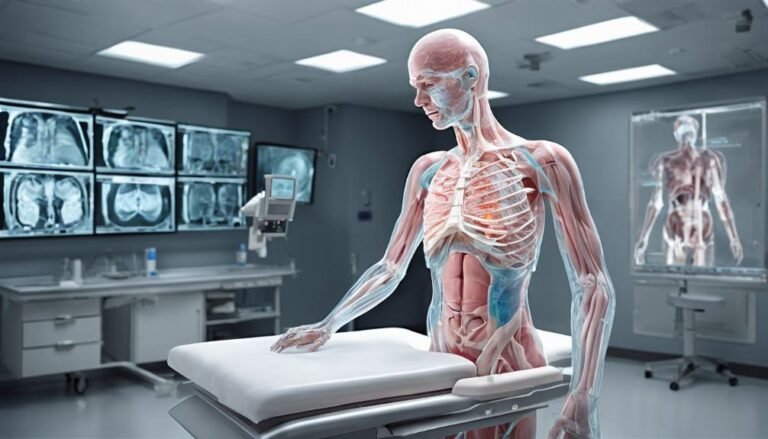AI in Medical Curriculum Development
Imagine a digital companion guiding you through the intricate web of medical knowledge, adapting to your pace and style of learning. The integration of AI into medical curriculum development is reshaping educational paradigms, but what are the implications for future healthcare professionals? How does this shift influence the acquisition of clinical skills and ethical decision-making processes? The intersection of artificial intelligence and medical education sparks curiosity and raises questions about the efficacy and sustainability of such innovations.
Key Takeaways
- AI enhances learning outcomes with real-time feedback and adaptive simulations.
- Personalized educational experiences are facilitated through AI technology.
- Assessment methods are improved using AI for tailored evaluations.
- Curriculum design is streamlined and optimized with AI integration.
- Ethical considerations like bias prevention and data security are crucial in AI integration.
Enhancing Learning Outcomes
To optimize educational effectiveness, incorporating AI into medical curriculum development can greatly enhance learning outcomes by personalizing instruction and providing real-time feedback to students.
Adaptive learning powered by AI allows medical students to progress at their own pace, focusing on areas where they need improvement while advancing quickly through mastered concepts. This personalized approach caters to individual learning styles, ensuring that each student receives the support they need to succeed.
Interactive simulations play an essential role in enhancing learning outcomes by providing students with hands-on experience in a risk-free environment. Through AI-driven simulations, medical students can practice clinical procedures, diagnose illnesses, and make treatment decisions in realistic scenarios. These interactive tools not only reinforce theoretical knowledge but also cultivate critical thinking and decision-making skills essential for medical practice.
Personalizing Educational Experiences
Enhancing educational experiences through the integration of AI technology enables tailored learning paths and personalized feedback for medical students. Essential technology plays a vital role in personalizing educational experiences by analyzing individual learning styles and preferences. By utilizing AI algorithms, educational platforms can adjust the content delivery to match the student's pace and comprehension level, ensuring maximum engagement and retention of information.
Student engagement is a key factor in the effectiveness of personalized educational experiences. AI can create interactive simulations, virtual patient scenarios, and gamified learning modules that cater to the diverse learning preferences of medical students. These interactive tools not only enhance student engagement but also provide real-time feedback, guiding learners towards areas that require improvement.
Furthermore, AI-powered chatbots and virtual tutors offer personalized assistance to students, answering questions, providing explanations, and offering additional resources based on individual needs.
Through the integration of essential technology, medical education can be transformed into a dynamic and personalized experience that fosters deeper understanding and competency among students.
Improving Assessment Methods
Analyzing the effectiveness and accuracy of assessment methods in medical education through AI integration allows for advancements in evaluating student competency and progress. By incorporating adaptive algorithms, assessments can be tailored to individual learning needs, providing a more personalized evaluation of knowledge and skills.
These algorithms analyze student responses in real-time, adjusting the difficulty level and content based on performance, ensuring a more vital representation of student capabilities.
Performance analytics play an essential role in enhancing assessment methods by offering detailed insights into student progress. AI can track and analyze data on student performance across various assessments, identifying patterns and trends that can help educators understand areas of strength and weakness.
This data-driven approach enables educators to provide targeted support and interventions to optimize student learning outcomes.
Incorporating adaptive algorithms and performance analytics in assessment methods not only improves the accuracy of evaluating student competency but also enhances the overall effectiveness of medical education by providing targeted feedback and personalized learning experiences.
Streamlining Curriculum Design
By leveraging artificial intelligence (AI) technologies, medical institutions can optimize and streamline the design of their curricula for enhanced educational outcomes. Through advanced data analysis, AI can assist in identifying key areas for improvement in the curriculum. By analyzing student performance data, AI can provide insights into which topics need more focus or revision, helping educators tailor the curriculum to meet the specific needs of the learners.
Curriculum mapping is another vital aspect where AI can make a significant impact. AI algorithms can efficiently organize and structure the curriculum by mapping out the relationships between different topics, ensuring a logical flow of information throughout the educational program. This aids in creating a cohesive learning experience for students and helps educators visualize the curriculum's overall structure more effectively.
Furthermore, AI can automate the process of updating and adapting the curriculum to incorporate the latest medical advancements and research findings. By streamlining curriculum design through AI-powered data analysis and curriculum mapping, medical institutions can make certain that their educational programs remain current, relevant, and optimized for student success.
Addressing Ethical Considerations
Ethical considerations must be carefully integrated into the development and implementation of AI technologies in medical curriculum design to guarantee the responsible and equitable advancement of educational practices.
Data security is a paramount concern when utilizing AI in curriculum development, as sensitive student information and personal data must be safeguarded against breaches. Implementing robust encryption protocols and access controls is vital to ensure the confidentiality and integrity of student data.
Additionally, bias prevention is essential in the deployment of AI technologies in medical education. Biases in algorithms can perpetuate inequalities and reinforce existing stereotypes, potentially affecting student learning outcomes.
Regular audits and reviews of AI systems can help identify and rectify any biases present in the curriculum design. Working towards transparency in the AI decision-making process and incorporating diverse perspectives during the development stage can help mitigate biases effectively.
Conclusion
In summary, AI in medical curriculum development offers a pathway to personalized progress, precise assessments, and ethical enhancements.
By integrating interactive simulations and adaptive learning paths, students can navigate a dynamic educational landscape. This technology guarantees a thorough and cutting-edge experience, safeguarding against biases and promoting critical thinking skills.
Embrace the evolution of AI in medical education for a tailored, transparent, and transformative journey towards excellence.







